|
|
|
Sort Order |
|
|
|
Items / Page
|
|
|
|
|
|
|
| Srl | Item |
| 1 |
ID:
179337
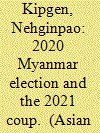

|
|
|
|
|
| Summary/Abstract |
In the 2020 general election, the National League for Democracy (NLD) won 920 of the total 1,117 seats, which was upped by 61 seats from its win in the 2015 election. The main opposition party, the Union Solidarity and Development Party (USDP), won 71 seats, down 46 from the 2015 election when it won 117 seats. The election result gave a strong mandate to the NLD for another five years. On the other hand, the USDP accused the NLD of engaging in electoral fraud including the buying of votes, and called for fresh elections in coordination with the military. Following a complaint from its proxy party, the USDP, the military initially said it would conduct an investigation in 218 townships where the military personnel and their family members cast their votes, which it expanded to 314 townships in all states and regions across the country; this finally led to the declaration of a state of emergency rule (the military coup) on 1 February 2021. Ethnic parties also alleged that the NLD government made certain pre-poll decisions that disadvantaged the ethnic minorities. This paper analyzes the electoral process and its outcome in an attempt to understand whether the election led to the deepening of democracy or the widening of division in the country's democratization process.
|
|
|
|
|
|
|
|
|
|
|
|
|
|
|
|
| 2 |
ID:
154740
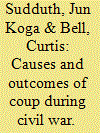

|
|
|
|
|
| Summary/Abstract |
Though approximately one in four coup attempts takes place during an ongoing civil war, scholars have not yet analyzed how the incidence of civil war affects coup attempts and outcomes. We conduct the first empirical analysis of the relationship between ongoing civil war and coup activity, finding (1) war increases the risk of a coup attempt, though (2) war-time coup attempts are significantly less likely to be successful, and (3) the risk of war-time coup is much higher when states face stronger rebel groups that pose greater threats to the political survival of the incumbent government. We attribute these findings to the pernicious effect of ongoing war on the welfare of the military elites and soldiers who have the greatest capacity to execute a coup attempt. As war diminishes their welfare and creates uncertainty about the future of the state, potential plotters become more willing to accept riskier coup attempts than they might plot during peace-time. Coup motivations are greatest when incumbents are more likely to lose their wars, and this causes coup plotters to attempt more and riskier coups when rebels are relatively strong.
|
|
|
|
|
|
|
|
|
|
|
|
|
|
|
|
| 3 |
ID:
180766
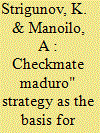

|
|
|
|
|
| Summary/Abstract |
IN A previous article,1 we wrote that Venezuelan and possibly Cuban security services might have successfully thwarted Operation Gideon thanks to an information leak from the entourage of Juan Guaidó. On May 3, 2020, Venezuelan troops, security services, and civilians prevented a coup attempt by Venezuelan deserters and American mercenaries hired by the private military company Silvercorp USA, owned by Jordan Goudreau, who incidentally did not take part in that terrorist attack. Two American terrorist mercenaries, Luke Denman and Airan Berry, and at least 47 Venezuelan deserters were taken prisoner. We surmised at that time that the Venezuelan authorities had been tipped off about Operation Gideon by Cuban intelligence agents in the United States, mainly in Florida, where there are comparatively large Cuban and other Latin American immigrant communities. Guaidó had visited Florida accompanied by supporters, who might have a leaked the Operation Gideon plan either accidentally or deliberately, as there might have been people in Guaidó's entourage who had been recruited as agents by Caracas and/or Havana.
|
|
|
|
|
|
|
|
|
|
|
|
|
|
|
|
| 4 |
ID:
154659
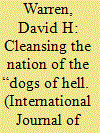

|
|
|
|
|
| Summary/Abstract |
This article contributes to an emerging scholarly debate over the support displayed by key Azhari ʿulamaʾ for the 3 July 2013 coup in Egypt and the subsequent massacres of anticoup protesters. I focus on the Islamic legal justifications articulated by the former grand mufti of Egypt ʿAli Jumʿa, which academics have contextualized primarily in relation to quietist precedents from late medieval Islamic political thought or his Sufi background. By contrast, I consider Jumʿa's justifications as representative of a nationalist discourse that has its historical origins in the protonationalism of Rifaʿa al-Tahtawi (d. 1873). My argument has wider implications for our conceptualization of the contemporary Islamic tradition. If, as scholars have argued, the Islamic tradition is a framework for inquiry rather than a set of doctrines, then in the 19th century a concern for the nation and its future became a key part of that framework. I contend that these additions came to redefine the worldview and politics of the ʿulamaʾ in terms of national progress and its horizon of expectations.
|
|
|
|
|
|
|
|
|
|
|
|
|
|
|
|
| 5 |
ID:
077134
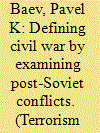

|
|
|
|
|
| Summary/Abstract |
Great many violent events happened during 1991-2005 in the 12 states that emerged after the collapse of the USSR but only a few civil wars are registered in the major datasets. That brings up a number of questions about the operational definitions of civil war that generally point in the direction of shifting the research attention from refining the quantitative parameters to grasping the essense of the phenomena in question. It is proposed that civil war partially overlaps with several other type of violent crisis: inter-state wars, civil unrest and revolutions, internal repression, military coups and mutinies, banditry and organized crime, and terrorism. These overlaps create six 'gray zones' where only very nuanced examination rather than application of rigid criteria could help in distinguishing civil wars from other crises. Therefore, data collection based on a single "robust" definition, which incorporates several verifiable parameters, is not necessarily the only path to scientific knowledge about civil wars
|
|
|
|
|
|
|
|
|
|
|
|
|
|
|
|
| 6 |
ID:
124759
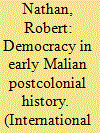

|
|
|
|
|
| Publication |
2013.
|
| Summary/Abstract |
The level of public support for the March 2012 military coup d'état in Mali surprised many observers who viewed the country as a viable democracy and believed its inhabitants perceived it in the same light. This article suggests that, despite this favourable appraisal by certain outsiders, many Malians had low levels of confidence in the democracy of President Amadou Toumani Touré, considering it corrupt and dysfunctional. In light of such attitudes in the present, this article turns toward the past to draw lessons from Mali's history of démocratie de façade. It examines Mali's earliest engagement with democracy in the late colonial era, and the manner in which democratic political discourse was abused by Mali's first postcolonial government. It suggests that Malian leaders' long history of invoking democratic principles for non-democratic aims may have weakened the legitimacy of the government following the 2012 coup d'état, and could make the reestablishment of confidence in Mali's democracy a more challenging task than simply organizing new multi-party elections.
|
|
|
|
|
|
|
|
|
|
|
|
|
|
|
|
| 7 |
ID:
116305
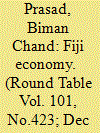

|
|
|
|
|
| Publication |
2012.
|
| Summary/Abstract |
Twenty-five years since the first military coup in 1987, Fiji continues to muddle through both politically and economically. The promise of a general election under a race-free constitution remains the fervent hope of all citizens. Economically the country continues to slide downwards, reflected in poor economic growth in 2010 and 2011. A poor level of private sector investment remains a feature of the macroeconomic picture, and it is unlikely to change for the foreseeable future. This article provides an overview of the Fiji economy and reflections on future prospects.
|
|
|
|
|
|
|
|
|
|
|
|
|
|
|
|
| 8 |
ID:
165447
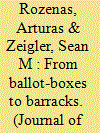

|
|
|
|
|
| Summary/Abstract |
The military often intervenes in politics shortly after elections. This might be because election results reveal information about the ease with which a coup can succeed. Would-be coup perpetrators use this information to infer whether the incumbent can be removed from office without provoking popular unrest. We argue that the informational content of elections depends on the electoral rules that translate votes into outcomes. In electoral systems that incentivize strategic voting, election returns are less informative about the distribution of political support than in electoral systems that incentivize sincere voting. An extensive battery of statistical tests shows that vote-shares of election winners do not predict coup attempts in plurality systems, which encourage strategic voting, but they do predict coup attempts in non-plurality electoral systems, which do not encourage strategic voting. Thus, incumbents who have performed well in elections face a lower risk of coup attempts, but only in institutional environments where voting results are highly informative about the distribution of political support. We apply this logic to illuminate the decisions of the military to intervene into politics during the famous failed 1936 coup in Spain and the successful 1973 coup in Chile.
|
|
|
|
|
|
|
|
|
|
|
|
|
|
|
|
| 9 |
ID:
178256
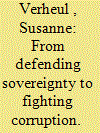

|
|
|
|
|
| Summary/Abstract |
In this article, I examine the shifting language of debates over law and justice in Zimbabwe in the run-up to, and following, the November 2017 coup. I argue that the rhetoric Zimbabwe African National Union–Patriotic Front (ZANU–PF) drew upon to secure its authority and negotiate legitimacy through law, shifted from a focus of ‘sovereignty’ and ‘protection’, to one of battling ‘corruption’ and ‘criminality’. At the same time, there remained a consistency in the manner that the legal system was used to target a select part of the country’s population, those opposed to ZANU–PF and its vision for the future.
|
|
|
|
|
|
|
|
|
|
|
|
|
|
|
|
| 10 |
ID:
159974
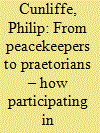

|
|
|
|
|
| Summary/Abstract |
This article provides a heuristic study of three cases where participation in peacekeeping operations prompted military rule in the peacekeeper-contributing state. These three atypical cases contradict the theory of diversionary peace, which claims that contributing to peacekeeping operations abroad should stimulate democracy at home. The experience of these three countries also calls into question the conventional wisdom that strongly associates peacekeeping with liberal democratic institutions, outcomes and practices. Via triangulation across literature, reports, elite interviews and WikiLeaks cables, these cases are examined in order to identify more generalisable observations regarding how participation in peacekeeping may enhance the role of the military at the expense of democratic order and civilian rule in the contributing state. The theory of diversionary peace is shown to suffer from serious conceptual flaws. Some preliminary efforts are made to generalise the findings, with Ghana and Uruguay identified as warranting further investigation. A number of variables are identified as offering scope for generalisation, namely, revenue, leadership and military size. Several promising areas for further research are also identified: how military dependence on peacekeeping may make political systems more permeable to outside influence, how far the United Nations (UN) can politically influence its contributor states and how peacebuilding may affect peacekeepers’ understanding of their role in their own countries. By examining the feedback effects of peacekeeping on peacekeeper-contributing states, the article reverses the conventional focus of peacekeeping scholarship and contributes to the growing literature examining the wider ramifications and unintended consequences of liberal conflict management.
|
|
|
|
|
|
|
|
|
|
|
|
|
|
|
|
| 11 |
ID:
088938
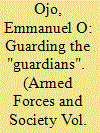

|
|
|
|
|
| Publication |
2009.
|
| Summary/Abstract |
Of all new states in Asia, Latin America, and Africa, Nigeria qualifies as one that has suffered recurring praetorianism. Nigeria was under firm military autocracy and absolutism for a longer period than civil rule. It is against this background that transitions from the military to civil rule in 1999 made the polity heave a sigh of relieve. However, the performance of the civil government is now a serious concern because of the system's inability to nurture and sustain democracy. Thus, this article reviews all previous coups and attempts an in-depth analysis of salient factors that may be a harbinger of democratic reversal. This paper infers that the performance of the state makes the military an alternative that is only waiting for another auspicious period to terminate the fledging democracy. The article calls for an increase in social spending if the so-called dividend of democracy will make Nigerians a catalyst for democracy.
|
|
|
|
|
|
|
|
|
|
|
|
|
|
|
|
| 12 |
ID:
132255
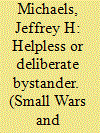

|
|
|
|
|
| Publication |
2014.
|
| Summary/Abstract |
The USA's role in fomenting and responding to military coups remains an understudied and politically contentious subject despite it being a recurring foreign policy problem exemplified most recently in both Egypt and Mali. To the extent this topic has been addressed in any depth by scholars, it is mainly limited to an examination of a small number of coups that occurred during the Cold War that the CIA was accused of sponsoring. However, this emphasis on well-known cases to the exclusion of lesser-known cases has resulted in a biased view of omnipotent US power. This limitation is reflected in the case of South Vietnam, in which the focus has been placed on the 1963 coup that overthrew President Ngo Dinh Diem, whereas the numerous other coups that occurred have received little or no attention. In this article, a more inclusive approach will be taken in which US policy will be examined with respect to all of the main coups and coup attempts that occurred during the period 1954-1975.
|
|
|
|
|
|
|
|
|
|
|
|
|
|
|
|
| 13 |
ID:
189714
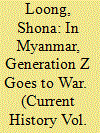

|
|
|
|
|
| Summary/Abstract |
Days after Myanmar’s February 2021 coup, young people took to the streets. The protests were tongue-in-cheek at first, but soon gave way to a grave civil war. Understanding this shift from nonviolent protests to armed resistance requires shedding two frames that have been applied to Myanmar in the past: those of liberal democracy and state failure. Doing so brings into focus how, to an extent unprecedented in Myanmar, the anti-coup movement is challenging entrenched divides between “democracy” and “ethnonationalism,” and between “conflict” and “politics.”
|
|
|
|
|
|
|
|
|
|
|
|
|
|
|
|
| 14 |
ID:
190763
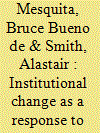

|
|
|
|
|
| Summary/Abstract |
Leaders shift political institutions to ameliorate threats to their tenure. The masses might rebel to replace the leader and change institutions. Disloyalty by political insiders might result in a coup. Leaders liberalize when the masses present a greater threat and ‘autocratize’ to dissipate threats from elites. A two-step procedure tests these arguments: (1) The risks of revolution and coup are estimated as a function of leader health, experience, economic conditions and extant institutions. (2) These risks are used to predict institutional change in a heteroskedastic regression model. The magnitude and direction of institutional change depends upon whether the masses or elites pose the greater threat. When both risks are high, leaders must gamble as to which risk they believe is greatest. In such circumstances, institutions are highly volatile even as the aggregate direction of change becomes unclear.
|
|
|
|
|
|
|
|
|
|
|
|
|
|
|
|
| 15 |
ID:
178255


|
|
|
|
|
| Summary/Abstract |
This article argues that, through the coup, the military has become more visible in national politics in post-Mugabe Zimbabwe. The current situation under President Mnangagwa marks a qualitative difference with the military under Mugabe’s rule. Currently, in now being more prominent, the military is politics and is the determinant of any political transition that may be forthcoming in Zimbabwe. However, if it deems it necessary, the military accommodates civilian politicians into politics in order to ‘sanitize’ the political landscape in its own interests. Simultaneously, despite their involvement in the coup, ordinary soldiers feel increasingly marginalized under Mnangagwa’s government.
|
|
|
|
|
|
|
|
|
|
|
|
|
|
|
|
| 16 |
ID:
193134
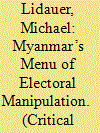

|
|
|
|
|
| Summary/Abstract |
One decade after Myanmar’s military regime organized non-competitive elections that unexpectedly commenced a period of political reforms, the military leadership upended this transitional period with a coup based on a narrative of electoral fraud. Cancelling the November 2020 election results which had confirmed the voters’ preferences for civilian rule, the military has begun organizing fresh elections while concurrently leading a war against the population. Building on Schedler (2002) and the debate on authoritarian elections, this article analyses the military’s contemporary menu of electoral manipulation as a comprehensive set of intertwined strategies. It integrates the analysis of various technical elements of the authoritarian electoral process that are often only looked at in isolation. The article deconstructs the military’s election-related narratives as self-legitimation in a region where authoritarian elections are the norm. Despite considerable efforts to forge conditions in their favor and create an aura of legitimacy, however, Myanmar’s military does not appear very imaginative in this undertaking, but employs a retrograde toolbox in a brutal manner. Whether this strategy is successful will not depend on the authoritarian leaders’ skills alone, but also on recognition from domestic, regional and international audiences which the junta’s performance seeks to achieve.
|
|
|
|
|
|
|
|
|
|
|
|
|
|
|
|
| 17 |
ID:
156538
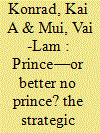

|
|
|
|
|
| Summary/Abstract |
Appointing a successor (the “prince”) allows the ruler (the “king”) to alter the structures of conflicts that take place between him and his potential challengers, as well as the structures of conflicts that take place among his potential challengers. Motivated by historical examples and using an infinite horizon rulership competition game, we show that while an appointed prince constitutes a powerful and dangerous threat to the incumbent ruler (the elevated threat effect), the appointed prince can also offer the incumbent ruler increased protection against other potential challengers (the barrier effect). We determine conditions when the overall effect of appointing a successor benefits the incumbent ruler and enables him to acquire a larger share of the governance rent in equilibrium.
|
|
|
|
|
|
|
|
|
|
|
|
|
|
|
|
| 18 |
ID:
180206
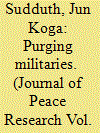

|
|
|
|
|
| Summary/Abstract |
The principal threat most autocratic leaders face stems from within the regime. To control militaries and mitigate the risk of coups d’état, many autocratic leaders repeatedly purge strong officers from the military. What are the causes and consequences of such purges? Despite its importance, scholars rarely have studied the question, as they have lacked a systematic and comprehensive dataset. The Military Purges in Dictatorships (MPD) dataset contains information on the dates and characteristics of 1,007 military purges, and covers 566 political leaders in 116 authoritarian countries over the period 1965 to 2005. In this article, I describe MPD, compare it with other datasets, present descriptive statistics on the data, and suggest its applications. By coding the timing and various characteristics of military purges, MPD facilitates empirical study of the relationships between autocratic leaders and their militaries, and thus is useful for researchers studying political violence, repression, civil-military relations, coup-proofing, leader survival, and regime transition.
|
|
|
|
|
|
|
|
|
|
|
|
|
|
|
|
| 19 |
ID:
184169
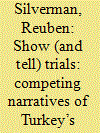

|
|
|
|
|
| Summary/Abstract |
Are show trials always one-sided affairs? In looking at Turkey, this article argues that they can be venues where competing versions of the past are offered to the public and outcomes need not be pre-ordained. In 1960, Turkey’s government was overthrown in a military coup. Within months of the coup, the military began trials to show the nation both how corrupt the former ruling party had been and how just the new regime would be. Accomplishing both goals proved difficult: by allowing the deposed leaders to tell their version of events, the trials provided an opportunity for defendants to offer an alternative account.
|
|
|
|
|
|
|
|
|
|
|
|
|
|
|
|
| 20 |
ID:
081830
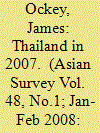

|
|
|
|
|
| Publication |
2008.
|
| Summary/Abstract |
The year 2007 marked a return to parliamentary rule in Thailand, with a new Constitution approved in August and elections in December. With democracy, some fear the return of popular former Prime Minister Thaksin Shinawatra, overthrown in the coup of 2006. Attempts by the coup group to contain Thaksin's influence continued throughout the year.
|
|
|
|
|
|
|
|
|
|
|
|
|
|
|
|
|
|
|
|
|